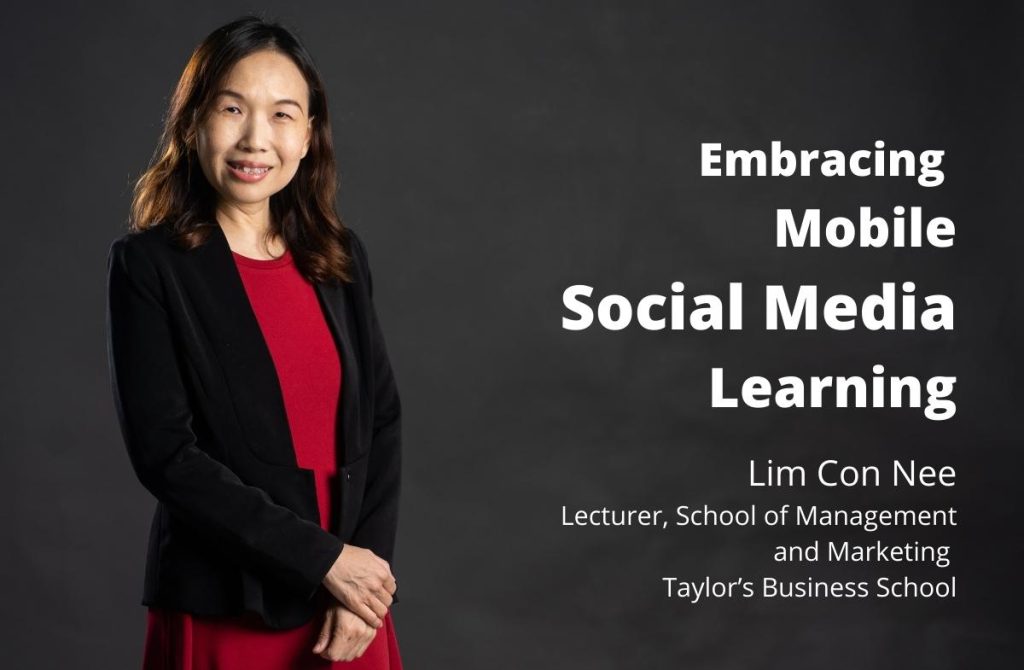By Lim Con Nee
In recent years, there has been a significant paradigm shift from conventional face-to-face learning to the new premise of social media learning in the comfort of one’s home, especially during the COVID-19 pandemic outbreak. Users choose content for their reading pleasure anytime anywhere via their ubiquitous mobile devices (or m-devices).
Consequently, the term “mobile Social Media Learning (mSML)” was aptly coined to refer to the connectivity of mobile learners that use social media on m-devices. This ingenious technology is the by-product of innovative thought that allows on-demand information to be acquired at the snap of your fingers, be it in a formal or informal learning setting.
The undisputed benefits of mSML include easy access to varieties of information, convenience, and enhanced two-way interactivity. This entails proactive changes for consumers to use social media for learning purposively such as watching YouTube to learn how to cook, create handicrafts, play the guitar, dance, catch up on self-study materials, as well as putting up online training materials for employees to upgrade themselves and to provide a platform to pick the best brains in businesses.
Meanwhile, for formal learning settings, employees could use this platform to upskill themselves. With rapid changes due to digitalisation, employees within an organisation need to develop new skill sets, or upgrade existing ones in order to perform better in their daily work.
From the perspective of marketers, moving into analytics, digital media, Search Engine Optimisation (SEO), and social media marketing, are all new dimensions in connecting with consumers. How many would have the skill and knowledge to use these tools, or even have a basic understanding of them?
Making mSML a lifestyle will be one of the ways to strengthen the workforce by providing them with a more convenient way to upskill themselves.
Through mSML, marketers could benefit by acquiring skills needed for the new digital economy, preparing them to be ready for IR4.0.
Secondly, imagine how much more the company can save and achieve through the seamless yet purposive learning via mSML through collaborative learning among employees.
For instance, mSML could be used to keep tabs on the dynamic chain of production and distribution in the industry, improve work performance and innovation through the exchange of ideas among co-workers in the gig economy, and access big data anytime anywhere for decision-making purposes, among others.
Ultimately, companies need to harness the power of positive network externalities from mSML.
However, as reality unfolds, the question remains; “Are companies willing to invest their resources i.e time, money and effort in mSML?”.
Companies such as Google, Microsoft and IBM have invested in an Enterprise Social Media (ESM) platform called “Slack” while Alibaba Group uses “Dingtalk” as their new form of communication, collaboration and information sharing platform among the employees.
As with any change, the average person will take a while to adapt to this novel technology that replaces conventional classroom learning in paving the way for learning without walls, with no restrictions on place and time to maximise creativity, innovation, performance, and agility.
Whilst risk-takers and innovators were the first to adopt more mobile-centric lifestyles with activities such as mobile shopping, mobile banking, mobile payment, mobile tourism, and mobile entertainment among others, yet there are still some neo-Luddites who are against technology to the point that they refuse to use it or even learn.
It is essential for one to practice lifelong learning in order to adapt to a world revolutionised by digital transformation, and mobile social media learning brings about an abundance of opportunities for both companies and individuals alike; offering quicker communication, collaborative learning and immense potential of information sharing to gain disparate knowledge and ideas beyond the confinement of words and text alone.
With the advent of modern technology, you can experience learning on-the-go, at your own pace, anywhere anytime you like.
Make a difference to learn purposively in the mobile-centric lifestyle in this digital era.
Be bold, be creative and be engaged!
Lim Con Nee is a Lecturer for the School of Management and Marketing at Taylor’s Business School, Faculty of Business and Law, Taylor’s University. Taylor’s Business School is the leading private business school in Malaysia & Southeast Asia based on the 2022 QS World University Rankings by Subject.
At Taylor’s University, Con Nee has taught many subjects across different levels of students from Foundation, Diploma and Degree programmes. She is currently pursuing her PhD studies at Taylor’s University. Her research interests include e-marketing, social media, and mobile learning.
MARKETING Magazine is not responsible for the content of external sites.










